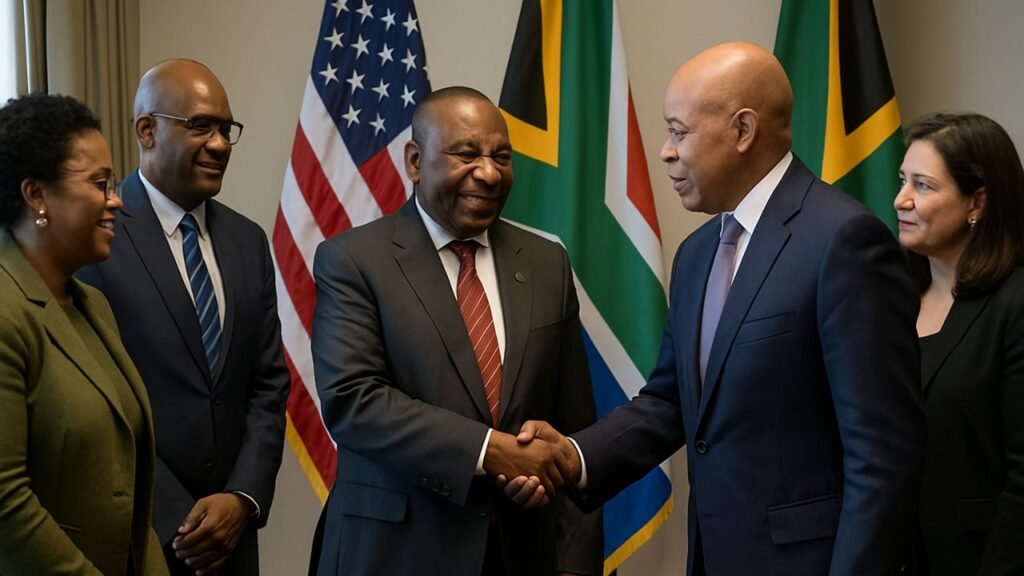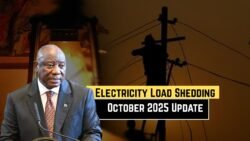South Africa Has Sent Officials – South Africa is actively pursuing stronger economic relations with the United States by sending top-level trade officials to Washington for formal discussions, as confirmed by President Cyril Ramaphosa. This strategic diplomatic move underlines South Africa’s intent to strengthen its global trade network, especially amid uncertainties surrounding the African Growth and Opportunity Act (AGOA), which provides preferential access for African products to the U.S. market. As one of Africa’s most industrialized economies, South Africa is eager to maintain and possibly expand its economic footprint in international markets. According to President Ramaphosa, these trade talks reflect the country’s ongoing commitment to sustaining growth, attracting investment, and preserving key trade agreements that fuel export industries. The outcome of these discussions could impact various sectors, including automotive, agriculture, and minerals, all of which are pivotal to South Africa’s GDP. The delegation includes senior representatives from the Department of Trade, Industry and Competition (DTIC) and other government bodies aiming to reinforce trade cooperation, explore new bilateral opportunities, and safeguard existing economic benefits under AGOA.

Why Strengthening U.S.-South Africa Trade Relations Matters Now
South Africa’s decision to send officials for trade talks with the U.S. comes at a critical time when AGOA is approaching expiration in 2025, creating uncertainty for African nations that rely on it for duty-free access to U.S. markets. With nearly $3 billion in goods exported to the U.S. under AGOA in 2023, South Africa stands to lose significant economic ground if the act is not renewed or if it faces stricter conditions. The visit reflects proactive diplomacy to ensure continuity of duty-free exports. In the global race for foreign direct investment (FDI), maintaining strong trade ties with leading economies is essential. By strengthening its partnership with the U.S., South Africa also seeks to improve investor confidence and reinforce its standing as a reliable economic partner. Trade ministers and economic envoys will present data, propose reforms, and negotiate sector-specific provisions that can unlock new funding and support local industries, especially in areas like manufacturing, clean energy, and digital services.
Implications for South Africa’s Key Export Sectors and Industrial Growth
The U.S. remains one of South Africa’s top five trading partners, and enhanced cooperation could boost industrial growth, particularly in key sectors such as automotive, citrus, wine, and precious metals. According to Statista, the U.S. accounted for a major share of South Africa’s automotive exports in recent years. South African manufacturers are hopeful that trade talks will yield a more favorable tariff regime and longer-term certainty under AGOA. In addition to physical goods, the South African government is pushing for U.S. support in technology transfer, infrastructure investment, and capacity-building programs that enhance export competitiveness. This diplomatic push also complements South Africa’s efforts to diversify trade partnerships through BRICS, while retaining access to Western markets. By negotiating from a position of mutual benefit, South Africa aims to secure better terms for value-added products, not just raw materials, thereby generating more jobs and enhancing its domestic industrial base. The success of these talks will be crucial for businesses, labor unions, and rural economies alike.
How This Move Aligns With South Africa’s Broader Economic Strategy
Sending a delegation to the U.S. is part of a broader economic diplomacy strategy promoted by President Ramaphosa to restore investor trust and build a sustainable, inclusive economy. This strategy includes re-engaging key partners, strengthening bilateral relationships, and leveraging South Africa’s leadership role within Africa. The timing of this move is significant, as it coincides with efforts to rebuild domestic infrastructure, reduce load shedding, and stimulate job creation through public-private partnerships. By focusing on international economic diplomacy, South Africa demonstrates its intent to be a global player and a gateway to broader African markets. The outreach to the U.S. is also a signal to multilateral institutions and potential foreign investors that the country is open for business and committed to structural reforms. This global outreach is further supported by initiatives from the International Trade Administration Commission of South Africa (ITAC) and the DTIC to simplify trade processes and promote South African exports across multiple industries.
Looking Ahead: What to Expect From the U.S.-South Africa Trade Talks
While no formal agreements have yet been signed, the U.S.-South Africa trade talks set the stage for renewed dialogue that may influence AGOA renewal and broader trade frameworks. Experts anticipate discussions around tariffs, compliance standards, and support for emerging sectors like green energy, digital services, and pharmaceuticals. South African officials are expected to advocate for longer AGOA extensions, expanded eligibility criteria, and reduced red tape for exports. U.S. trade representatives may also raise concerns about governance, transparency, and intellectual property protection, issues that have surfaced in previous bilateral reviews. The outcome of these talks will not only affect trade flows but also shape the geopolitical alignment of South Africa in the context of global power shifts. As South Africa walks the line between its BRICS alliances and Western trade partners, diplomacy and pragmatism will be key. For local exporters, farmers, and small manufacturers, the next few months could bring either new opportunities or increased competition depending on how these negotiations unfold.







